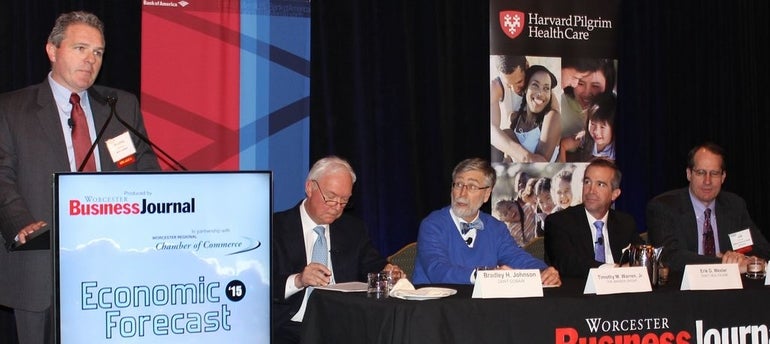Away from the bone-chilling cold outside and the snowy, frigid weather forecast for the weekend, an economist with the Federal Reserve Bank of Boston delivered something warm Friday at the Worcester Business Journal’s annual Economic Forecast breakfast: continued economic growth.
Jeff Fuhrer, executive vice president and senior policy adviser for the Boston Fed, told about 200 attendees at the Beechwood Hotel in Worcester that he expects the U.S. economy will grow between 2.5 percent and 3 percent this year, with the unemployment rate dropping from 5.6 percent to around 5.25 percent and inflation, helped by falling oil prices, to end the year with a tame gain of about 1.25 to 1.5 percent.
And the price of oil, which fell nearly 50 percent between January and December of 2014, will keep inflation low and forestall any increases by the central bank on interest rates, which have been at or near zero percent for six years since the onset of the Great Recession.
“The fact that the price of oil is lower (is) kind of like putting a little more money into everybody’s pocketbook because they’re not changing dramatically the amount of energy they consume,” Fuhrer said. “So that makes a difference.”
How much of a difference? It “maybe” adds 0.6 percent over the next few quarters to the nation’s gross domestic product, which measures the output of goods and services. And it probably cuts “core inflation,” a measure of price movements for items that are not subject to volatility, such as energy, by 0.2 percent.
While the Fed has the power to adjust interest rates upward to keep prices from rising too high, having several years of near-zero rates is a new phenomenon, Fuhrer noted.
But how long can interest rates stay at that level? In the slide presentation that accompanied his address, Fuhrer predicts they’ll begin to inch up around the middle of the year.
“Interest rates cannot stay at zero percent,” he said.
Locally and regionally, economic indicators are trending upward, especially employment and housing prices, Fuhrer said. In Central Massachusetts, prices are rising more slowly, but “going up gradually,” he said.
Growth in Central Mass.
Data presented by chamber President Timothy Murray underscored the growth in the region. Murray said the addition of 5,762 new jobs in the Worcester area over the past few years has helped fuel a 5-percent jump in median income, helping make the city grow, compete for business and keep local college graduates in the area.
In the panel discussion that followed Fuhrer’s address, Bradley H. Johnson, vice president and general manager for Saint-Gobain Abrasives North America, which has operations in Worcester and Northborough, said the company’s location in Central Massachusetts has allowed it to recruit local talent while adding jobs to its site in Worcester, the former Norton Co.
But while Johnson called this region good for high-tech manufacturing and research and development (the Northborough R&D facility is the company’s largest in the world), concerns over high taxes and the cost of living can make it difficult to thrive here.
Johnson and panelist Erik Wexler, CEO of the Northeast Region for Tenet Healthcare, the parent company of Saint Vincent Hospital in Worcester and MetroWest Medical Center in Framingham and Natick, say more job training is crucial. Wexler, in particular, said there has been a chronic shortage of newly trained nurses.
Another panelist, Timothy M. Warren, CEO of The Warren Group in Boston, which watches the real estate market, said job growth is helping the housing market as some buyers purchase homes before prices rise. In his presentation, he said he expects a “modestly” better year for real estate in 2015. While the annual average of single-family home sales is down over the last nine years, compared with the previous 10, it suggests a pent-up demand that should produce more sales in the coming years, he said.
Warren also said Worcester’s cheaper real estate prices compared with those of the Boston area should be marketed as an advantage.
The discussion was moderated by R.D. Sahl, former television news anchor with New England Cable News and now a media consultant and professor of broadcast journalism at Boston University.
(Editorial intern Brittany Lopriore contributed to this report.)

